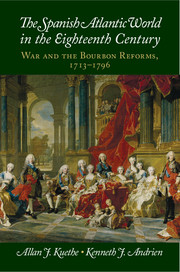Book contents
- Frontmatter
- Contents
- Introduction: War and Reform in Spain and Its Atlantic Empire
- I Alberoni, Patiño, and the Beginnings of Atlantic Reform, 1713–1736
- II The Second Wave of Reform, 1736–1763
- III Pinnacle of the Bourbon Reforms, 1763–1796
- 7 The First Phase of Reform under Charles III, 1763–1767
- 8 The Reorganization of Spain’s Atlantic Empire, 1767–1783
- 9 Adjustments and Refinements in the Reformist Agenda, 1783–1796
- Conclusion: War and Reform in the Spanish Atlantic World
- Timeline for the Spanish Atlantic World in the Eighteenth Century
- Bibliography
- Index
- Plate section
- References
9 - Adjustments and Refinements in the Reformist Agenda, 1783–1796
Published online by Cambridge University Press: 05 June 2014
- Frontmatter
- Contents
- Introduction: War and Reform in Spain and Its Atlantic Empire
- I Alberoni, Patiño, and the Beginnings of Atlantic Reform, 1713–1736
- II The Second Wave of Reform, 1736–1763
- III Pinnacle of the Bourbon Reforms, 1763–1796
- 7 The First Phase of Reform under Charles III, 1763–1767
- 8 The Reorganization of Spain’s Atlantic Empire, 1767–1783
- 9 Adjustments and Refinements in the Reformist Agenda, 1783–1796
- Conclusion: War and Reform in the Spanish Atlantic World
- Timeline for the Spanish Atlantic World in the Eighteenth Century
- Bibliography
- Index
- Plate section
- References
Summary
The period following Spain’s victory in the War of the American Revolution allowed Madrid to consolidate and to refine gains made in its reformist agenda by advancing additional administrative, fiscal, military, and commercial innovations. Underlying tensions arose from problems with finance, however, particularly owing to mushrooming military expenditures for both land forces and the armada. Although humbled and stripped of its North American colonies, Great Britain still possessed a superior navy, which posed a continuing military threat in the Atlantic world, but new thinking was in order. In confronting the challenges that faced it, Spain enjoyed capable leadership from the Conde de Floridablanca and his ally in the royal cabinet, Pedro López de Lerena. Skillfully working its way through the incredibly complex issues that it faced, the Madrid government would push reform of the imperial system to its pinnacle. Bolstered by a highly productive empire, Spain once again would stand among the great powers of the western world. While the crown used the American revenues to advance Spain’s military standing, however, little was invested to develop the economic infrastructure of the metropolis or the Indies. As a result, Madrid’s successes in reorganizing its empire over the eighteenth century would ultimately fall victim to international conflict, first to the wars of the French Revolution and ultimately to two disastrous conflicts with the British beginning in 1796, which would put a definitive end to the reforming impulse in the Spanish Atlantic world.
- Type
- Chapter
- Information
- The Spanish Atlantic World in the Eighteenth CenturyWar and the Bourbon Reforms, 1713–1796, pp. 305 - 345Publisher: Cambridge University PressPrint publication year: 2014



